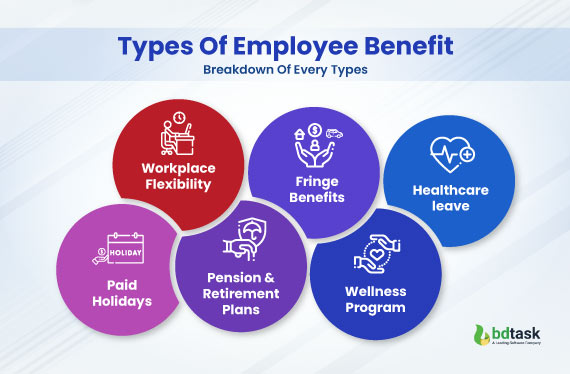Hiring talent in Berlin, Bangalore, or Buenos Aires? Offering competitive employee benefits isn’t just about attracting top talent—it’s a complex dance of local laws, cultural expectations, and strategic budgeting. Get it wrong, and you risk fines up to €20 million under GDPR, talent exodus, or even operational shutdowns. But get it right, and you unlock a loyal, productive global workforce.
This guide cuts through the complexity, revealing how to design benefits packages that win abroad—without drowning in compliance nightmares.
Why Global Employee Benefits Abroad Matter More Than Ever
The Global Hiring Surge
- 65% of companies now employ workers in 3+ countries, but 43% lack localized benefits frameworks.
- Remote work has made cross-border hiring mainstream, yet non-compliance penalties average $2.1 million per violation.
Beyond Legal Compliance
Benefits influence everything:
- Talent retention: 78% of employees stay longer with companies offering tailored benefits.
- Employer branding: Competitive packages make you stand out in crowded markets like India’s tech sector.
- Productivity: Well-supported employees report 31% higher output.
Key Challenges in Managing Global Benefits
1. The Compliance Maze
Every country has unique—and changing—rules:
- Mandatory benefits:
- Mexico’s Christmas bonus (15 days’ pay).
- France’s 5 weeks of paid vacation.
- Germany’s employer-split health insurance (50/50).
- Penalties: Brazil fines 200% of unpaid wages for missed 13th-month salary.
2. Cultural and Customary Expectations
Legal minimums ≠ competitive packages:
- In China, Lunar New Year bonuses (13th/14th month pay) are customary.
- Polish employees expect medical check-up subsidies.
- U.S.-style 401(k) plans fall flat in countries with robust state pensions.
3. Administrative Overload
- Tracking 100+ benefit variations across countries.
- Currency fluctuations impacting stipend values.
- Data privacy risks (GDPR, China’s PIPL) when handling health records.
4. Cost Management
- Health insurance in the U.S. costs 3x more than in Spain.
- Balancing equity: Offering identical benefits globally ignores local cost-of-living disparities.
Mandatory vs. Customary Benefits
| Country | Mandatory Benefits | Common Customary Perks |
| Brazil | 13th-month salary, 30 days PTO | Meal vouchers, transport allowances |
| India | 24 weeks paid maternity leave, EPF | Gym memberships, wellness stipends |
| Japan | Health insurance (50% employer-paid) | Housing allowances, commuter subsidies |
| UAE | Health insurance, end-of-service gratuity | Flight allowances, education grants |
Health Insurance Variations
- UK: Supplemental private coverage (NHS is public).
- Germany: Public insurance split 50/50 + private options.
- US: Employer-sponsored plans required for 50+ staff.
Unique Local Benefits
- Chile: Profit-sharing bonuses for profitable companies.
- Netherlands: Work-from-home equipment stipends.
- France: 50% public transport cost coverage.
How Employer of Record (EOR) Services Simplify Global Benefits
An EOR acts as your employees’ legal employer abroad, handling benefits while you manage their work.
EOR Solutions for Benefits Management
- Compliance Assurance: Automates mandatory benefits (e.g., Mexico’s profit-sharing, India’s EPF).
- Tailored Packages: Builds competitive perks using local benchmarking (e.g., China’s 13th-month bonus).
- Cost Control: Negotiates group rates for health insurance across 150+ countries.
- One-Stop Administration: Manages enrollment, renewals, and claims via a single dashboard.
Case Study: A SaaS startup used an EOR to hire 50 engineers globally. The EOR handled:
- Germany’s employer health contributions.
- India’s statutory bonus calculations.
- Brazil’s Christmas bonus payouts.
Result: 80% faster onboarding and zero compliance penalties.
Best Practices for Designing Global Benefits Packages
1. Balance Standardization with Localization
- Global Core: Safety nets like mental health support or life insurance.
- Local Flexibility: Adjust PTO to match France’s 30 days or Singapore’s 14 days.
2. Leverage Technology
- Benefits Platforms: Tools like Deel or Rippling automate multi-country payroll/benefits.
- AI Analytics: Forecast regional benefit trends using tools like PwC’s Compliance AI.
3. Prioritize Employee-Centric Flexibility
- LSAs (Lifestyle Spending Accounts): Let employees allocate funds to wellness, childcare, or upskilling.
- Stipends: Health/wellness allowances for out-of-pocket expenses (e.g., dental, therapy).
4. Conduct Regular Compliance Audits
- Quarterly checks for:
- Law changes (e.g., UAE’s 2025 health insurance expansion).
- Pay equity (EU’s gender pay gap reporting).
- Data security (GDPR/PIPL alignment).
5. Partner with Local Experts
- EORs: For end-to-end benefits administration.
- Consultants: Navigate nuances like Poland’s medical check-up subsidies.
Future Trends in Global Employee Benefits
1. Hyper-Personalization
- AI-driven platforms recommend benefits based on life stage (e.g., fertility support in the UK, eldercare in Japan).
2. ESG-Linked Benefits
- Carbon-offset commuting stipends (EU’s CSRD compliance).
- Volunteer time off for community initiatives.
3. Blockchain for Transparency
- Smart contracts auto-execute bonuses (e.g., Chile’s profit-sharing).
- Tamper-proof records for benefits enrollment.
4. Mental Health Integration
- Global teletherapy partnerships (e.g., Headspace for 100+ countries).
- “No-Meeting Fridays” as standard in benefits packages.
Conclusion: Turn Benefits into Your Global Advantage
Navigating employee benefits abroad isn’t about checking boxes—it’s about building a culture where global talent feels valued, protected, and empowered. By combining Employer of Record (EOR) expertise with agile, employee-centric strategies, you can:
- Slash compliance risks by 68% while scaling teams faster.
- Boost retention with locally resonant perks.
- Transform benefits from a cost center to a talent magnet.
Start small: Audit one country’s benefits package, pilot an EOR partnership, or introduce an LSA. The world’s talent is waiting—equip them with benefits that matter, and watch your global ambitions thrive.
Share
Export
Rewrite
Related
Meta Title: What Employers Must Know About Employee Benefits Abroad
Legal Mandates: Countries have specific statutory requirements such as pensions in the UK or paid maternity leave in India.
Cultural Norms: Certain perks like Christmas bonuses in Mexico or extended vacation policies in France are customary.
Tax Regulations: Benefit offerings must align with local tax laws to avoid penalties.
Employment Laws: Termination procedures vary widely; some countries require lengthy notice periods or severance pay.


